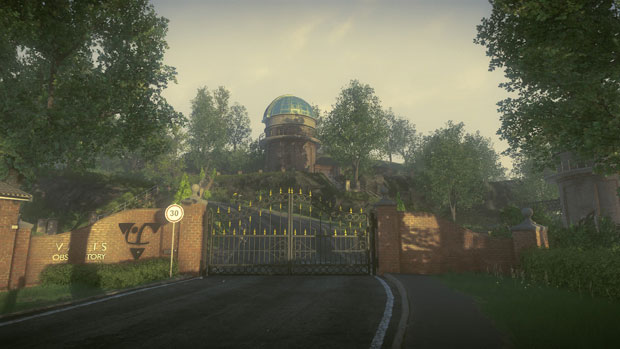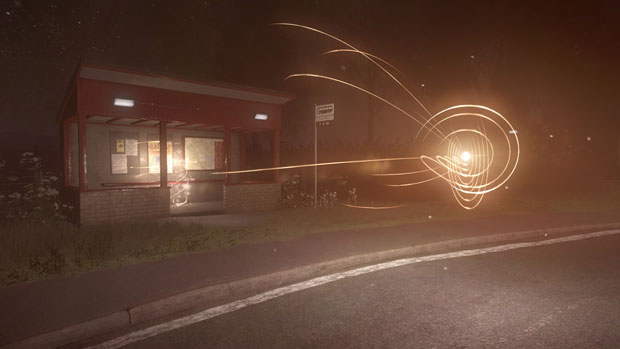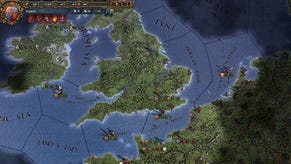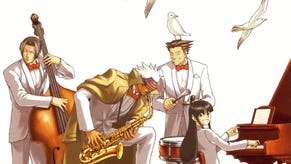Tears In Rain: Everybody's Gone To The Rapture
Rain, faith and rapture
I was hoping to finish Everybody's Gone to the Rapture [official site] on Friday so that I could share my thoughts with the bold members of the RPS Supporter Program. Friday night turned into Saturday morning and I was still playing, however, and I only managed to finish very late last night. In an extension of observations I shared with Supporters last night, here are some personal reflections on the game and how it provoked memories of childhood holidays and class-based anxieties.
Note: there are references to characters, game mechanics and events through to the mid-point of the game, but no direct story spoilers.
This Is England
Lots of British critics have responded to Rapture by saying something along the lines of, “OMG, I've been there! I have bloody well been there!” They might be talking about the village itself (fictional but recognisable) or the pub or even a payphone.
They're right to express that feeling. It's vaguely unsettling to realise that the very first shot of the game, with a pylon in the distance, feels more English than a Sunday roast. Sheets billowing in the breeze on washing lines, bus stop graffiti that uses the word 'knobhead', the road markings. The devil is in the details and Yaughton is a devilish place.
I live a long way from Shropshire. The last time I visited, three years ago, I was on a camping trip and didn't even see a village as big as Yaughton for more than a few minutes in passing. More recently, I passed through Dufton, neary Appleby-in-Westmorland, and although its houses don't have the thatched roofs, and the countryside is less idyllic and a little bleaker, the village is constructed around a public green the likes of which don't really exist in my home, just to the north of Manchester in what was once Lancashire.
Even our villages have a more industrial appearance. Yaughton looks like a place where wealth was inherited rather than earned. That probably says as much about my biases and assumptions as it does about this fictional place, but the fact that those real life sentiments can be so easily ascribed to it is credit to its design and fidelity.
Imperfect World
For all of its occasional beauty, Yaughton isn't the ideal of the British village. The Stars At Night pub is a good example of this. It's a faintly disappointing location, with a beer garden that threatens to bleed onto the village green and distinctly lacks a bubbling brook or other water feature that would finish it off nicely. It doesn't have the best views and has clumsily accommodated an almost wrap-around beer garden that faces into the centre of the village rather than offering views of the hills around.
Inside, it's pokey (I'm annoyed that I can't get behind the bar for a staff's eye view) and it's easy to imagine the darts teams taking over the entire end of the bar, grumbling at anyone who tries to pass. It's one of those places that initially looks like it'd be welcoming to walkers and other visitors but, in reality, you'd struggle to get served and feel like you were on the end of some withering whispers and glances.
It must have been tempting to create an idealised vision of the English country pub and the imperfections of The Stars At Night are one of the game's most convincing features.
Ye Of Little Faith
Churches make me feel peculiar. Older churches, at any rate. It's the history that affects me mainly, although some residue of spiritual feeling is stirred. It's as much cultural and ancestral as specific to my own life, but even the history is a history of spirituality. That gives it extra weight
I'm uncertain about most things in life so I'm happy to describe myself as agnostic when it comes to the big unknowables. Truth be told, I'm just as uncomfortable around adamant atheists as I am around religious zealots. It's not that I'm particularly open to the idea of any God or pantheon that has ever been detailed, it's that I'm a believer in the weird and unknowable boundaries between what we know and what we can never know. There's room there, I think, for powers and forces beyond reckoning.
Essentially, I believe in the amazing infinity of things and the one thing I know about all of that is that there'll always be mystery. I don't ascribe to the idea of a creator or a divine guiding force, but I do believe that the sciences are tools by which to comprehend and/or marvel at mysteries rather than reason to dismiss them.
I don't understand how my computer makes images appear from all over the world. It's all magic to me.
All of this is a roundabout way of saying that I found myself liking Father Jeremy, who is a somewhat archetypal outsider man of the cloth. He's in a position that demands respect but his apparent inexperience and modern ways see him undercut and misunderstood by his parishioners. He's a humanist first and a deist second, or so it seems to me in what little I've learned about him.
The church felt like a sacred place – so did the pub, mind – because of Jeremy and those who had come before him, not because of the presence of a god.
Backtracking And Bridleways
In my teenage years (I was a teenage rambler, though not on purpose and usually in solitude), I was never sure whether I was breaking the rules when I walked on a bridleway. They're like public footpaths but for horses. Hoofpaths. I'd find myself walking down one and then there'd be a line of horses coming in the opposite direction and all the riders would look down on me as if I were muck as they passed by.
Was that because I was breaking the law by stepping in their horsey lanes? Was I endangering the horses by crowding the passage and potentially causing alarm? That seemed believable, given that there were often trains of horses, indicating inexperienced riders in need of a helping hand. A tiny person clinging to a hedgerow to try and give them space might seem like an obstacle to a skittish horse, and as soon as one bolted or bucked, the entire equine column could collapse, causing untold damage to riders, beasts and hedgerow alike.
Chances are, the riders looked down on me for no other reason than that they were literally above me. And because they were rich gits who wanted nothing more than the legal right to trample me into the dirt. Hard to be sure.
Everybody's Gone to the Rapture made me feel like a trespasser. I hadn't realised how much forward progress there'd be in the game, expecting to spend the majority of my time backtracking across the village's green and the few accessible buildings thereabouts. There's loads more to see though. And while you don't have to backtrack at all (there's both forward momentum and a clever circular structure), there are plenty of chances to double back using alternate routes, usually cutting through woods and by streams rather than following a road.
Everytime I headed off the beaten track, I found myself scanning for signs designating the barely-visible dirt path I was following as a public footpath. Like so many things in the game, it was like stepping into a memory. That's how I behave in the real world when I'm in what estate agents and councils describe as a “semi-rural environment”, always scanning for permission to walk. Permission to cut through. Permission to exist.
Again, this seems like a peculiarly British thing. In cities, we live in houses packed in side by side, or in blocks of flats stacked one on top of the other. The people in the countryside all seem to have acres of their own land and never have to rub shoulders with a stranger or a neighbour unless they choose to do so. And yet when we venture into those acres, we do not wish to encroach. We are not allowed to encroach.
We who have been raised to commute face-to-armpit with our fellow workers, and who can smell the food and the farts of our neighbours, who can hear them groaning and grunting through cold Saturday nights; faced with a path with no 'Public Footpath' sign, we so often turn back. Wouldn't want to intrude. Wouldn't want to get in the way.
And, fuck me, I'm playing a game, a piece of fiction, set in a world where NOBODY EXISTS ANYmORE, and I'm still worrying about property laws. That class-conditioning may be the most pathetically English thing I've ever done.
Still, if the game was set in the good ol' USA, I'd be worried about getting chainsaw massacred rather than a 'tsk', a sternly written letter and a frown of contempt. Weird how rural England makes me fear the landed gentry while rural America is built around fears of the outsider rather than the system itself.
I Don't Wanna Miss A Thing
Poor Frank. He's one of the characters in the game and I failed to give him any closure.
It took me at least an hour of playing to realise that there were proper actual game-y rules to story progression in Rapture. At first, I was wandering around looking at whatever took my interest – going into shops, checking out the garage, peering at every bloody tissue in the doctor's surgery. There's a ball of flight hovering around the place, sure, but I'd go and see what it was up to in my own time.
That's fine. It works. The game allows you to do your own thing at your own pace (as long as that pace is slow, natch) if that's the way you want to approach it. I don't think any areas are gated, requiring progress before they'll unlock, though I may be wrong.
But the story is gated. I went to the church early on, having realised that the chapter I was playing through was linked to the vicar. It's a place with an air of finality about it and it teases at things not yet known. I expected drama, tragedy and some kind of new thread to pull on.
Nothing happened.
I walked down the aisle like a bride who'd shown up on the wrong day or fallen prey to some horrid prank. Expecting the music to kick in and streamers to fall from the ceiling, I left, re-entered and tried again. Still nothing.
I'd gone to church too early and that's when I realised how the rules work.
Those balls of light will happily lead you through each chapter of the story if you follow them. They're like excitable dogs on a country walk but instead of sniffing piles of poo or puddles of piss, they stop to point out areas of interest, places that they're connected to in some way. They fizz and spark when they see those areas and sometimes come rushing back down the path toward you, figuratively tugging at your trouser leg or shirt sleeve and begging you to come and investigate.
You're free to ignore them but if you do, you might not find closure on each chapter. I'm not sure if the game intentionally left me in the dark regarding Frank or if I broke the scripting by accidentally starting the next chapter before finishing his, but I've moved on and left that story untold. Or unfinished, at any rate.
It may be intentional, that ability to leave loose ends, and it's not as if there aren't gaps in the characters' lives (and deaths?) even if a completionist route is taken. There doesn't need to be a full stop at the end and I've come to accept Frank's lack of an ending but, at first, I was frustrated by the apparent imposition of a rule that hadn't been explained. I felt punished for not understanding the relation between the game's chapters and the open world environment. Chapters end when you move too far, it seems, rather than when you've seen all that there is to see.
Rain
I've never seen distant rainclouds depicted so well. The first time I remember seeing rainfall from a distance, I was on top of Holcombe Hill, where I spent many a happy summer's day in my childhood. It was bright, warm and clear, but in the distance we could see heavy, black clouds. And below them, a smudge as if they were watercolours that had run down the page of the sky.
It was rain. I didn't understand how rain could look so solid.
Rapture captures British weather perfectly. The rain transforms pretty scenes into dreary postcards from the crappest holiday ever. Drizzle and downpour both have unique qualities to wash away the fake plastic attraction of an English caravan park or seaside resort, leaving the cracks, the peeling paint and the dog dirt in the sandpit exposed for everyone to see. The sun, on the rare occasions when it appears, feels like the facepaint that disguises the clown's tears.
Empathy
Deceit, gossip, anger, infidelity, prejudice, self-loathing and anxiety. Familes have fallen apart, misunderstandings have become local mythology and too many people are happy to cast the first stone.
Amid all the ugliness, Rapture forgives though. I find the mysteries of the plot frustrating in places but as an exploration of characters, the writing is generous, warm and convincing.
I've been playing cooperatively, as Pip recommended. One of us plays, the other watches. We talk. I occasionally say, “don't look at me right now” as I try to stifle a big, wet sob. I'm a sentimental sort.
There are flaws, and our review mentions all the ones worth mentioning, but I haven't played a game that's worked its way into my brain so much in quite some time.


















